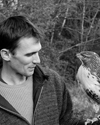ST. FRANCIS I & THOU

by Henry Walters
I dreamt I was with St. Francis, circled by birds. They were shy, expectant: maybe Orpheus had ushered them down from the air in the air’s language, but from this man came only odd little hiccoughs & hums & whistles, emitted by chance, like the ticks of a wound-down clock. He held out thistle seed that slipped through his fingers & could be had by darting in behind him as he walked. He made an awkward human & an awkwarder bird, stooped & gangly, thick of beard, thin of face. “Francis,” I said, “you’ve done your part, they’ve eaten. We’ll be late for prayers.” He was easing his hand out to a blushing finch, which hopped away. “How long might it take,” he asked, “for birds to think of me as one of their saints?”
I dreamt I was with St. Francis among the birds. He had not called them, as others have said. He had been doctoring stones. He took gravel in hand, rubbed each piece with a thumb, licked it, held it between his teeth, replaced it. This was the work of a madman, & I told him so. & he answered me, saying, “& if I do not minister to the pebble, which my feet grind to dust, which has naught but its own weight for pay & its face for love, how then shall I minister unto myself, whose maladies are in the inarticulate air & my distances from birds?” I swore, & called him lunatic, & it was then I beheld the starlings, long tight scarves of them swirling, folding, re-infolding upon themselves, like the secret mechanism of Aurora Borealis. When they came overhead, they seemed suddenly to feel their own weight & drift to earth, & there being not a tree in sight settled to roost on Francis & on me as on two chokecherry bushes, in our hair, on our arms, in our rags. So thick were they on the road, it seemed paved with a shifting flint & mica. The racket of wings & voices set my scalp afire, & Francis was bending down for another stone.
I dreamt I was with the birds, too many to name, too many to feed, & some were already preying on one another, pinning them down, jays eating wren-chicks, hawks eating jays, pluming them feather by feather to get to the breast-meat, but slowly, thoroughly, the victims neither killed nor kept alive, but simply enduring until they died, sometimes before their eyes were gored, eyes being the beak’s one access to the skull, or else before the gizzard was pulled out & set aside, with unforeseen delicacy, as a surgeon extracts a gallstone, or a wisdom tooth, gizzards being full of grit, & entrails waste, though the livers most certainly were not left, being extremely rich & dark—but sometimes not, they lived longer, their eyes stayed open, blinking, till they were out, & their beaks stayed open, not screeching or wailing, simply enduring, till their hearts were out, or after, & sometimes the hawk would stop working the breast & shift to the wings & begin plucking there, feather by feather, with no more ferocity than a chickadee’s that shells your sunflower seed, & this was happening all around me, the ground was gizzards & entrails & a bed of stray feathers shifting in the wind like blown snow, & for once I knew just what to do, there was nothing to do, I sang my same old simple song in all directions & shut my eyes. You keep on seeing, only louder.
Photo by Madeleine Bruce

